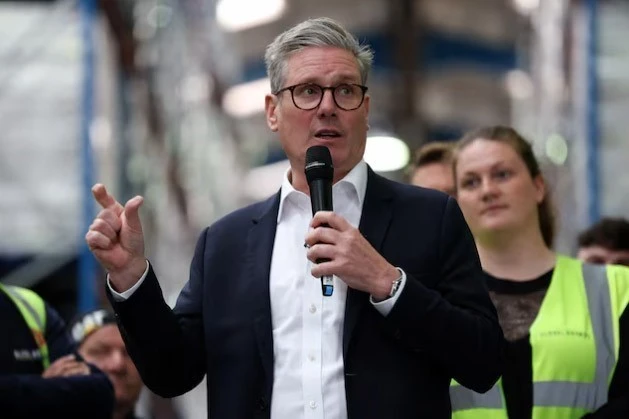(VOVWORLD) - After winning 40% of the vote in the UK’s parliamentary general election on Thursday, the Labour Party will be able to form a new government, ending 14 years of Conservative Party rule.
 PM Rishi Sunak and his wife at a polling station on July 4, 2024. (Photo: Reuters/VNA) PM Rishi Sunak and his wife at a polling station on July 4, 2024. (Photo: Reuters/VNA) |
Initial results announced by the UK Electoral Commission on Friday showed the Labour Party winning about 40% of the vote, equivalent to approximately 410 seats in the next House of Commons, which far exceeds the 326 seats needed to form a government. Prime Minister Rishi Sunak's ruling Conservative Party was running second with about 140 seats, the worst election performance in the party’s history.
Predicted results
The UK’s general election result was no surprise because, for nearly 2 years, every public poll in the UK has indicated that the opposition Labour Party would score a landslide victory over the Conservative Party in the next election. Observers say the cause has been the steady weakening of the Conservative Party for nearly a decade, starting with former Prime Minister David Cameron’s referendum on leaving the European Union, Brexit, in 2016.
Brexit, which derived from political calculations within the Conservative Party, pushed the UK into a series of consequences, including the breakdown of relations with the EU, huge economic losses, and a struggle for leadership leading to the replacement of four Prime Ministers within three years.
Spending too much political capital on Brexit and negotiations of a post-Brexit agreement with the EU weakened the governance capacity of successive Conservative governments. A poor response to the COVID-19 pandemic and many scandals during Boris Johnson’s administration, and a disastrous economic strategy during Liz Truss’s administration has reduced the reputation of the Conservative Party to its lowest level in decades. British voters have turned to the Labour Party, even though it has also encountered internal troubles and policy deadlocks under the leadership of Jeremy Corbyn.
"I’m not even sure that Labour is spectacularly rising. I think the Conservative is spectacularly falling. It’s just we’ve reached the end of a long election cycle where the Conservative has been in power for 14 years," said Professor Mark Shanahan of Surrey University. "It’s been through a succession of leaders from Cameron to May to Johnson to Truss to Sunak. The general mood in the country is that it’s time for change.”
Tim Bale, professor of politics at Queen Mary University in London, said Rishi Sunak inherited a negative legacy from his predecessors. Boris Johnson blew away the Conservative Party's reputation for unity and integrity with a partying scandal during the COVID-19 epidemic, and Liz Truss destroyed the party’s reputation for economic management with her shocking fiscal policy which forced her to resign after just 50 days in power.
Bale said that, in addition to benefitting from the weakness of the Conservative Party, the Labour Party has also received support from a large number of Scottish National Party voters.
 Labour leader Keir Starmer speaks at an electoral campaign in Clay Cross on July 2, 2024. (Photo: Reuters/VNA) Labour leader Keir Starmer speaks at an electoral campaign in Clay Cross on July 2, 2024. (Photo: Reuters/VNA) |
What will change for the UK?
This year's electoral victory, one of the biggest victories in the Labour Party's history, has returned it to power after 14 years. With the one-word campaign slogan "Change", the Labor Party promised to radically change the UK.
Labour leader Keir Starmer, who will become the new Prime Minister, said, "Tonight, people here and around the country have spoken and they're ready for change, to end the politics of performance, a return to politics as public service. You have voted. It is now time for us to deliver."
Observers say the task of the upcoming Labour Party government will not not easy, as the British economy has been on the brink of a recession for years, the cost of living is crushing households, and public services are in crisis.
Matthew Johnson, Professor of Public Policy at Northumbria University in Newcastle, said studies conducted in many localities in the UK show that 65-75% of British voters are yearning for changes in the health care system, social security, and the strategy for transitioning to net-zero CO2 emissions while protecting labor rights and incomes.
"What we might see over the next year is the new incoming government has to draw from these policies to retain its popularity. Doing nothing simply will not work across the next tenure. We need to act now,“ said Johnson.
The new Labour government may also have to make some changes in external policy. In a meeting with foreign reporters on Monday, David Lammy, who will likely be the new British Foreign Secretary, said the Labour government will carry out "3 remakes" in its foreign policy: remake relations with the EU based on the new UK-EU security treaty, remake climate policy so that the UK will take the lead in climate commitments, and remake relations with the Global South and the world's middle powers in the context of an increasingly multipolar world.